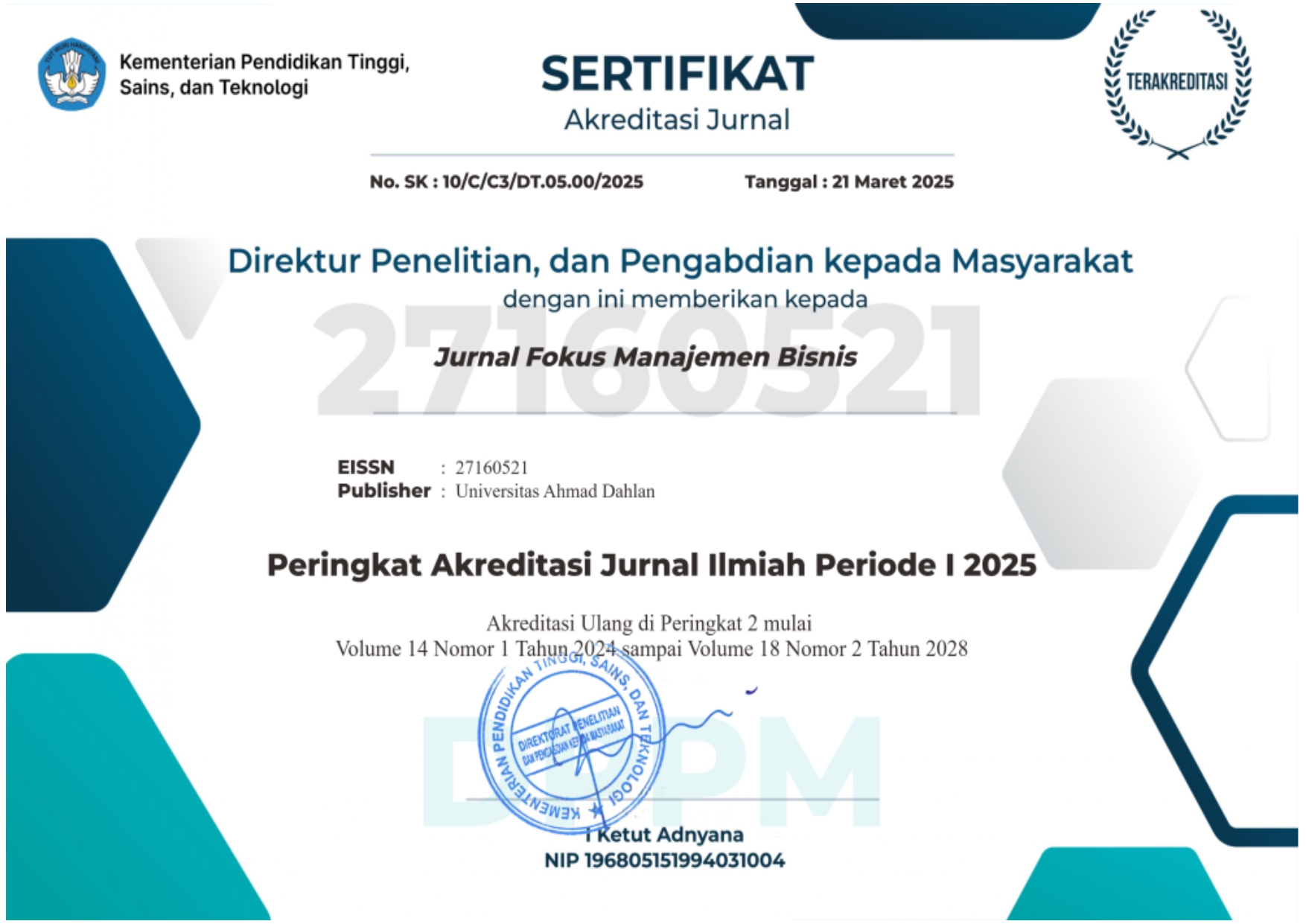ANALISIS EFEK KONSEKUENSI PENILAIAN KINERJA PADA MOTIVASI DAN PRODUKTIVITAS KARYAWAN: STUDI PADA TRIBUNNEWS.COM-SOLO
DOI:
https://doi.org/10.12928/fokus.v11i1.3892Keywords:
Performance Appraisal, Motivation, ProductivityAbstract
Performance appraisal is acknowledged as one of the most important human resource practices. A performance appraisal system is a critically needed tool for effective human resource management if it is done systematically and effectively. This research examined whether performance appraisal influences employee motivation and employee productivity in Tribunnews.com-Solo. This research was conducted in Solo and the samples of this research were 50 employees of Tribunnews.com-Solo. This research was conducted in the quantitative method by using questionnaires for collecting the data. The data were analyzed with a linear regression test and normality test by using SPSS 25. The results of this research shows that performance appraisal has positive influences on the employee’s motivation and productivity.
References
Anjum, A., Ming, X., Siddiqi, A. F., & Rasool, S. F. (2018). An Empirical Study Analyzing Job Productivity In Toxic Workplace Environments. International Journal of Environmental Research and Public Health, 15(5), 1035.
Arslan, M., Sohail, M., & Zaman, R. (2014). Improving Productivity through Appropriate Performance Appraisal in Pakistan State Oil Limited. European Journal of Business and Management, 6(28), 2222-2839.
Ciobanu, A., Androniceanu, A., & Lazaroiu, G. (2019). An Integrated Psycho-Sociological Perspective on Public Employees’ Motivation and Performance. Frontiers in Psychology, 10, 36.
Deepa, E., Palaniswamy, R., & Kupusamy, S. (2014). Effect of Performance Appraisal System in Organizational Commitment, Job Satisfaction, and Productivity. The Journal Contemporary Management Research, 8(1).
DeNisi, A., & Smith, C. E. (2014). Performance Appraisal, Performance Management, and Firm-Level Performance: A Review, A Proposed Model, and New Directions for Future Research. Academy of Management Annals, 8(1), 127-179.
Fried, Y., & Slowik, L. H. (2004). Enriching Goal-Setting Theory with Time: An Integrated Approach. Academy of Management Review, 29(3), 404-422.
Gichuhi, A. W., Abaja, P. O., & Ochieng, I. (2013). Effect of Performance Appraisal on Employee Productivity; A Case Study of Supermarkets in Nakuru Town, Kenya. Asian Journal of Business and Management Science, 2(11), 42-58.
Hair Jr, J. F., Page, M., & Brunsveld, N. (2019). Essentials of Business Research Methods. Routledge.
Hamidi, Y., Najafi, L., Vatankhah, S., Mahmoudvand, R., Behzadpur, A., & Najafi, A. (2010). The Effect of Performance Appraisal Results on the Personnels Motivation and Job Promotion. Australian Journal of Basic and Applied Sciences, 4(9), 4178-4183.
Hanaysha, J. (2016). Testing The Effects of Employee Empowerment, Teamwork, and Employee Training on Employee Productivity in Higher Education Sector. International Journal of Learning and Development, 6(1), 164-178.
Harrington, J. R., & Lee, J. H. (2015). What Drives Perceived Fairness of Performance Appraisal? Exploring The Effects of Psychological Contract Fulfillment on Employees’ Perceived Fairness of Performance Appraisal in US Federal Agencies. Public Personnel Management, 44(2), 214-238.
He, W., Chen, L., & Liu, W. (2020). Does New Performance Appraisal System (EVA) Affect Earnings Management?. Nankai Business Review International.
Idowu, A. O. (2017). Effectiveness of Performance Appraisal System and its Effect on Employee Motivation. Nile Journal of Business and Economics, 3(5), 15-39.
Ikramullah, M., van Prooijen, J. W., Iqbal, M. Z., & Ul-Hassan, F. (2016). Effectiveness of Performance Appraisal: Developing A Conceptual Framework Using Competing Values Approach. Personnel Review, 45(2), 335-352
Iqbal, M. Z., Akbar, S., & Budhwar, P. (2015). Effectiveness of Performance Appraisal: An Integrated Framework. International Journal of Management Reviews, 17(4), 510-533.
Iqbal, M. Z., Akbar, S., Budhwar, P., & Shah, S. Z. A. (2019). Effectiveness of Performance Appraisal: Evidence On The Utilization Criteria. Journal of Business Research, 101, 285-299.
Kim, T., & Holzer, M. (2016). Public Employees And Performance Appraisal: A Study of Antecedents To Employees’ Perception of The Process. Review of Public Personnel Administration, 36(1), 31-56.
Locke, E. A. (1968). Toward A Theory of Task Motivation and Incentives. Organizational Behavior and Human Performance, 3(2), 157-189.
Locke, E. A., & Latham, G. P. (2006). New Directions In Goal-Setting Theory. Current Directions In Psychological Science, 15(5), 265-268.
Longenecker, C., & Fink, L. (2017). Lessons for Improving Your Formal Performance Appraisal Process. Strategic HR Review, 16(1), 32-38.
Olanipekun, W., Brimah, A., Brimah, B., & Rabiu, R. (2016). Impact of Performance Appraisal on Employees Motivation and Performance-Evidence from Food and Beverage Industry. Advances in Multidisciplinary and Scientific Research, 2(4), 57-66
Onyije, O. C. (2015). Effect of Performance Appraisal on Employee Productivity in a Nigerian Industry. Journal of Economics and Business Research, 21(2), 65-81.
Reizer, A., Brender-Ilan, Y., & Sheaffer, Z. (2019). Employee Motivation, Emotions, and Performance: A Longitudinal Diary Study. Journal of Managerial Psychology, 34(6), 415-428
Sarkar, A. (2016). Is It Time To Do Away With Annual Performance Appraisal System?. Human Resource Management International Digest, 24(3), 7-10
Quinlan, C., Babin, B., Carr, J., & Griffin, M. (2019). Business Research Methods.
Downloads
Published
How to Cite
Issue
Section
License
Authors who publish with this journal agree to the following terms:Â
- Authors retain copyright and grant the journal right of first publication with the work simultaneously licensed under a Creative Commons Attribution License that allows others to share the work with an acknowledgment of the work's authorship and initial publication in this journal.
- Authors are able to enter into separate, additional contractual arrangements for the non-exclusive distribution of the journal's published version of the work (e.g., post it to an institutional repository or publish it in a book), with an acknowledgment of its initial publication in this journal.
- Authors are permitted and encouraged to post their work online (e.g., in institutional repositories or on their website) prior to and during the submission process, as it can lead to productive exchanges, as well as earlier and greater citation of published work (See The Effect of Open Access).






